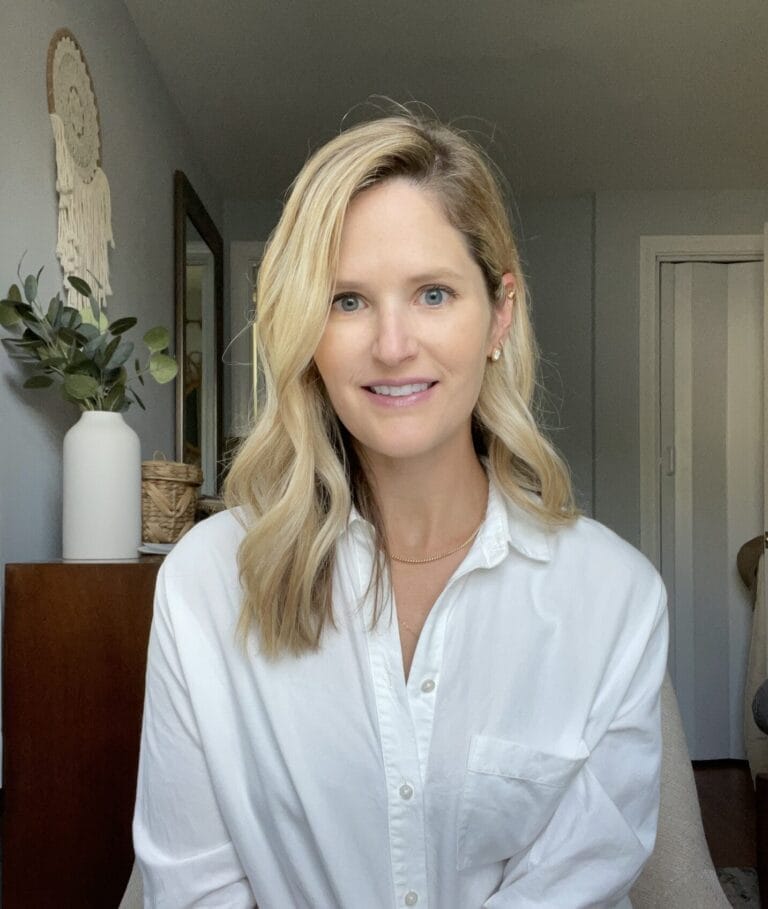
Kristina Bielkevicius always knew she wanted to work in psychology. After studying psychology as an undergrad, she started working with the adult population with people with Alzheimer’s disease in a clinical setting. Realizing she really loved children, she began exploring how she could work in an educational setting and entered grad school to become a school psychologist. She’s been practicing for 5+ years in a variety of settings. Kristina was born in Canada, raised in Maryland, and attended the University of British Columbia and Boston University. She has three sisters—when one sister moved to the West Coast, everyone else followed including their parents. She currently lives in Los Angeles with her husband and daughter.
What made you want to be a teletherapist with PL?
At the time that I applied for a teletherapist position, I was on maternity leave and was looking for a way to slowly get back into the workforce while having flexibility in my schedule. Since my husband is a pilot, we move and travel often, and so being able to work remotely was a great fit for me. After researching PresenceLearning, I was so impressed with how resourceful and organized it is.
What do you enjoy about being a provider with PL?
I love being able to interact with a diverse group of children having a wide variety of needs. It keeps me on my toes and wanting to learn more about things that I have not experienced before in my other school psychologist positions. Working remotely means that I am able to reach so many more areas and populations that I wouldn’t be able to if I worked in a traditional school setting.
I really like doing evaluations. I like writing reports. In the places I was assigned, they didn’t need the counseling piece so I just fell into it. I’m ok with that because I do work at another school as my other job. I do a lot of 1:1 counseling there. It’s a small private elementary school that a colleague referred me to—they weren’t big enough for a full-time person and were looking for someone to contract. So I’m getting all my needs met.
What were you most surprised about when you made the transition to be a teletherapist?
Before I began training and working directly with students, I was mostly concerned with the logistics. I was unsure of how things would work when I wasn’t face-to-face with the students. Once I practiced and learned more about the platform we use, I was pleasantly surprised with how easy and user-friendly it has been. Also, our onsite aides are very organized and already have procedures in place so we can focus on the student and doing our jobs effectively.
I knew I was going to be doing psycho-ed evaluations. I couldn’t conceptualize how I would do that over the computer because there are so many testing materials I was used to using with students that are physical. I was anxious about doing it so I did some practice sessions with a few other providers which really helped me. It was hard to figure out how it would work until I actually did it, and then you realize, it’s actually really organized and straightforward, but if you haven’t done it before, it wouldn’t make sense.
What do you find most challenging about being a teletherapist?
Not being a physical part of the school community can be challenging. So much of our work relies on obtaining information from others, which is more difficult when the initial trust and interaction isn’t always there. Also, it requires constant adaptability on our part as teletherapists because every setting does things differently and we have to remain very organized and proactive.
I was also worried about connecting. I haven’t had a hard time connecting with students over the computer. It’s actually been pretty easy. I think it’s been more challenging connecting with the school community—people there not knowing who I am, when a lot of it requires that I reach out to different people and get information from them. If there’s not that trust or understanding of who I am, I find it really hard to get that collaboration and I feel like I have to pester people and remind them to get me things. With parents as well, if they get a phone call from me, they might not even know about PresenceLearning and don’t really know who I am. I think that is always an ongoing challenge, fitting into the community the way that you would if you are there in person. There’s only so much you can do when you are not there and you can’t meet them.
I’ve been fortunate. The one school I work at a lot in the San Francisco Bay Area has an awesome team. They are so good about communicating with parents and getting them onboard and understanding who we are and what we’re doing. I think that’s really the key—everyone is open and transparent about it so there’s no surprises.
Have you found anything in particular that you can do to open up lines of communication when you first get an assignment?
I figured out who I was going to be working with as far as case managers on that end. I sent them emails introducing myself and what I was going to be doing and what my expectations were about my role and their role, and what kind of information I’d be needing. And fortunately I’ve been able to work with those same people so at this point we know each other and I haven’t had to meet too many new people. That’s been really nice because I’m assigned to specific schools so for the last two years I’ve been able to work with the same people. It’s been pretty easy.
Another district I work for is in a remote rural area so there’s not always lot of connection between the schools and staff. It’s been a little harder to establish myself and have them understand what I am doing there. The primary support people are actually wonderful to work with but they are limited because they’re spread so thin. The opportunity to connect and set up appointments runs a little slower because there are fewer people, and so much distance to cover there. There’s less time to build a relationship. It’s more about just getting stuff done. Also the timelines there are shorter. You only have 30 days to do an assessment vs. 60 days. So once I get the stuff I need, I have to get everything done right away. There’s not as much time to talk to people and explore. I know they’re trying to work on this and set it up better.
What types of students are you assigned to for evaluations?
In San Jose, all elementary aged students. 99% are English Language Learners which has been really good. Being in L.A., the population here is highly English Language Learners as well. It was nice for me to get back into working with ELLs, and to familiarize myself with best practices because I don’t speak Spanish. I’ve had to be creative about how I get information from those students and parents. So that’s been a good experience for me. In WA I am all over the map from pre-school to high school and older. I am helping some over 18s needing help with transitions. As far as disabilities and needs, most of the students I work with have some kind of learning disability like a processing disorders mostly affecting reading and then I am also working with students with emotional and behavioral concerns.
Could you walk us through your daily routine? A “day in the life of a PL therapist” if you will?
Because I work part-time at another school onsite and I do need some consistency, I have dedicated 3 days entirely for my work with PL. On those 3 days I wear my PL hat and try to schedule all my IEP meetings and testing sessions for those days.
I work better knowing what I have to do that day and keeping organized. I also suggest this for other providers. For things like IEP meetings or regular meetings, everyone knows what days you’re working, so it’s a lot easier for them to coordinate. Instead of always having to ask me “Are you available?” they know I am always available those 3 days. That’s just something that has worked really well for me.
I get up when my 2-year-old wakes up, so nice and early. I’m fortunate that she goes to daycare really close to my house so I usually drop her off or my husband drops her off if he’s home. Right when I get back, I get ready. I usually have my first appointment at 8:30 or 9 depending on the school.
Most days I start off the day with one or two testing sessions so it’s usually a 2-hour block of time with a student to do what I need for an evaluation. But I try not to do that for too long because they get tired and I want them to have fun and be able to go back to class. So I usually do that for the first half of the day and then I’ll have lunch or throw in a load of laundry or run to the grocery store real quick.
Then in the afternoon, I may have an IEP meeting because they usually have them after school. I’ll typically have one meeting in the afternoon, maybe two out of the three days, sometimes only one day. If I don’t have a meeting, then I use that time to write my reports because that is pretty time consuming. The report writing is probably the most time consuming part. Fortunately I have time to do it, so as soon as I am finished testing, and I have all the scores, I start writing the report so I don’t have a huge 20 page report to write the night before the IEP meeting.
I organize my days that way. And then if I am really lucky and I’m really on top of it, I might even be able to go get a massage or do something for myself before I have to pick up my daughter. I really like that I can build in things I need to do as a mom, or little things I wouldn’t normally be able to do if I was at a full time job at a certain place. That really reduces my stress levels overall. It just makes the balance a lot better and more manageable. And I think it makes me more productive—when I give myself a certain amount of time, I’m a lot better at meeting that timeline and I am surprised with the fact that I still have more time to do the other things that I need to do. I’ve been so grateful that I have this setup because I know a lot of people don’t have this.
What is one piece of advice to offer a school psychologist considering making a transition to telepractice?
The Lounge on the PL platform really helped me in the beginning. I remember that was one of the first things I did. I connected with other school psychologists asking them questions about what to expect or asking them for advice. That really clarified things for me. I was having a hard time understanding what this was going to look like. So I thought I’d ask people who were doing what I was going to be doing. I would definitely recommend that. Connect with someone who’s been there.
Then connect with the people you are working with. At the schools where I’ve been assigned, I’m not the only psych working there. There are a couple of PL psychs so I’ve connected with them. We have group emails and email each other random questions that we don’t want to bother other people with…and that has worked really well because we can be pretty honest with each other and we know what we’re dealing with. It’s been helpful having that relationship with other providers.
Try to get as organized as possible. I have so many spreadsheets going. For me to be able to manage all the different sites I have, this has been really helpful. I would definitely recommend that right when you get started, try to have as many things going that can help you remember who’s where and when things are due. If you can do that from the beginning and make a habit to update it when you need to, it makes you a lot less stressed and worried that you’re going to forget something or miss a timeline you forgot about. To learn about the school in the beginning of an assignment, I go to the school website to see what I can learn, and I also look at the area on a map to figure out what the area is like—what the people there have access to, socio economic status, etc.
I’m at 7 or 8 schools total between the 2 districts I serve. That’s a lot to keep track of. Since you’re not meeting all of them face-2-face, it’s hard to remember sometimes!
Any last comments?
PresenceLearning is a great company. I’m impressed with how widespread PL is and how supportive everyone is. There are challenges that come with teletherapy and PL has been very on top of it. You have people who have done all the basics for you. The leadership in general has been really impressive. Going into it as a new provider, the leadership is really awesome.
Are you interested in joining the PL Care Network? Visit our Provider page to submit your application today!




